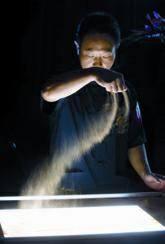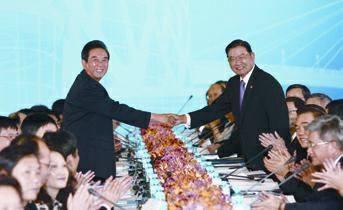Migrant Population



The total number of migrants in China reached 230 million last year, or 17 percent of the countrys total population, according to a report issued on August 6 by the National Population and Family Planning Commission.
With an average age of 28, 80 percent of migrants are from rural areas and nearly 45 percent of them were born after 1980, the annual report said.
The average monthly pay for those at or below the age of 35 was just 2,513 yuan ($395) in 2011. The figure represented a 29.4-percent increase from that of 2009, but was not nearly enough to cover their housing and health care in light of the increasing cost of living.
For migrants with a bachelors degree or higher, the average monthly pay amounted to 4,608 yuan ($725).
Generally, only 51.3 percent of migrants hold fixed-term contracts, the report said, adding that they work an average of 54.6 hours per week, far above the 40-hour legal limit.
Nature Reserves Alliance
Four major nature reserves covering 550,000 square km in west China jointly announced on August 7 an alliance to protect the environment of the Qinghai-Tibet Plateau.
The four reserves are Chiangtang Nature Reserve in Tibet Autonomous Region, Hoh Xil Nature Reserve and Sanjiangyuan Nature Reserve in Qinghai Province and Altun Mountain Nature Reserve in Xinjiang Uygur Autonomous Region.
At an average altitude of 4,000 meters, they cover 58.3 percent of national nature reserve areas, and together they can be considered the worlds largest nature reserve group. With a fragile environment, the areas are the habitat of many of Chinas unique animals, such as Tibetan antelopes, wild yaks and Tibetan wild burrows, among others, and they are the key to the nations ecological security.
Officials from the four nature reserves plan to set up a joint wild animal database to share information and reinforce daily communications.
The information platform will also set up a reporting system to crack down on poaching and keep tourists from disrupting wild animals.
Pharmaceutical Regulation
The Chinese Government on August 2 introduced tougher measures concerning the production of pharmaceutical excipients following a scandal involving contaminated medicine capsules.
According to a new regulation on the management of pharmaceutical excipients, or pharmacologically inactive substances used to carry the active ingredients of medication, the State Food and Drug Administration (SFDA) and its branches will raise standards for excipients when approving new medicines. The regulation will take effect on February 1, 2013.
Excipients that are new on the market or contain greater safety risks should be registered and approved, and their producers will have to obtain production licenses from authorities, the document says. Other excipients and their producers will be monitored.
The SFDA will set up a national database to monitor the production and application of all pharmaceutical excipients, as well as a credit reporting system for producers, said Zhang Wei, head of the Registration Division under the SFDA.
The regulation says pharmacy firms should be held responsible for quality control problems resulting from the use of illegal and substandard excipients. The firms should also supervise the quality of excipients and regulate their suppliers, the regulation says.
A China Central Television report delivered in April said that several companies had manufactured drug capsules with industrial gelatin, which contains excessive levels of chromium and is illegal to use for making drug capsules.
The industrial gelatin was made from leather scraps, according to the report.
NEW ROUND TALK Chen Yunlin (left), President of the Chinese mainland-based Association for Relations Across the Taiwan Straits, and Chiang Pin-kung, Chairman of the Taiwan-based Straits Exchange Foundation, hold the eighth top-level talks between the two organizations since 2008 in Taipei on August 9
Flying Man Injured
Chinas track and field star Liu Xiang again saw his gold-medal hopes dashed prematurely when he crashed into the first barrier in the opening heat of the 110-meter hurdles at the London Olympic Games on August 7.
Liu received a rousing ovation from the crowd of 80,000 as he hopped down the track to symbolically cross the finish line, kissing the last hurdle.
It was the second time Liu failed in the first round of Olympic Games. Four years ago, he was forced to withdraw due to a tendon injury at the 2008 Beijing Games.
Liu was diagnosed with an achilles tendon fracture this time and will undergo surgery in Britain.
Liu, 29, is one of the worlds best athletes in 110-meter hurdles. He started training for track and field in 1990, and went on to win gold in the 110-meter hurdles with a 12.91-second finish at the 2004 Athens Olympics, tying the 11-year record of Britains Colin Jackson. Lius historic victory in Athens made him the first Asian man to win gold in track and field, a popular sport around the world.
Though China took 51 gold medals to top the tally in Beijing, it lags behind the rest of the world on the track and therefore regards Liu as a national treasure. In 2006, Liu set a new 110-meter hurdles world record in a time of 12.88 seconds in Lausanne, breaking the record that had stood for 13 years.
Mining Safety
China will start a nationwide campaign to improve safety of mines, the Work Safety Committee of the State Council, Chinas cabinet announced on August 3.
The three-year campaign is aimed at consolidating the sector, regulating mining activities and shutting down illegal or danger- ous mines.
Although the number of mining-related accidents and deaths has dropped in recent years, the sheer number of mines will make improving their safety a challenging task, the committee said.
Ninety-five percent of Chinas 100,000 metal and non-metal mines are smaller mines that are prone to accidents, the committee said.
Subsidies for Students
Chinese students at various levels received more than 98.6 billion yuan ($15.51 billion) in subsidies in 2011, up 16 percent year on year, according to the Ministry of Education.
The government contributed 70 percent of the subsidies, while the rest was contrib- uted by a student loan program, income from school-affiliated sectors and donations, said a statement issued by the ministry on August 8.
The subsidies were used to guarantee equal access to education for all citizens, especially those of disadvantaged economic status.
Nearly half of the subsidies went to students in higher education institutions, with about 14 percent paid in the form of government-subsidized student loans.
Under a government-subsidized student loan scheme, the government pays the interest on bank loans taken out by college students and students pay off the balance in installments after graduation.
In 2011, 2.4 million college students received 13.6 billion yuan ($2.14 billion) of loans under the scheme, up 2.3 billion yuan($362 million) from the previous year, according to the statement.
Marrow Donors
Potential donors enlisted in the China Marrow Donor Program (CMDP) has totaled 1.492 million, making the marrow bank the worlds fourth largest in terms of donors.
The CMDP has facilitated about 3,000 hemopoietic stem cells donations for patients at home and abroad and it has uploaded the information of 50,000 donors to the World Marrow Donor Association, said Zhao Baige, Executive Vice President of the Red Cross Society of China (RCSC) said August 2.
The CMDP was established in 1992 by the RCSC.

